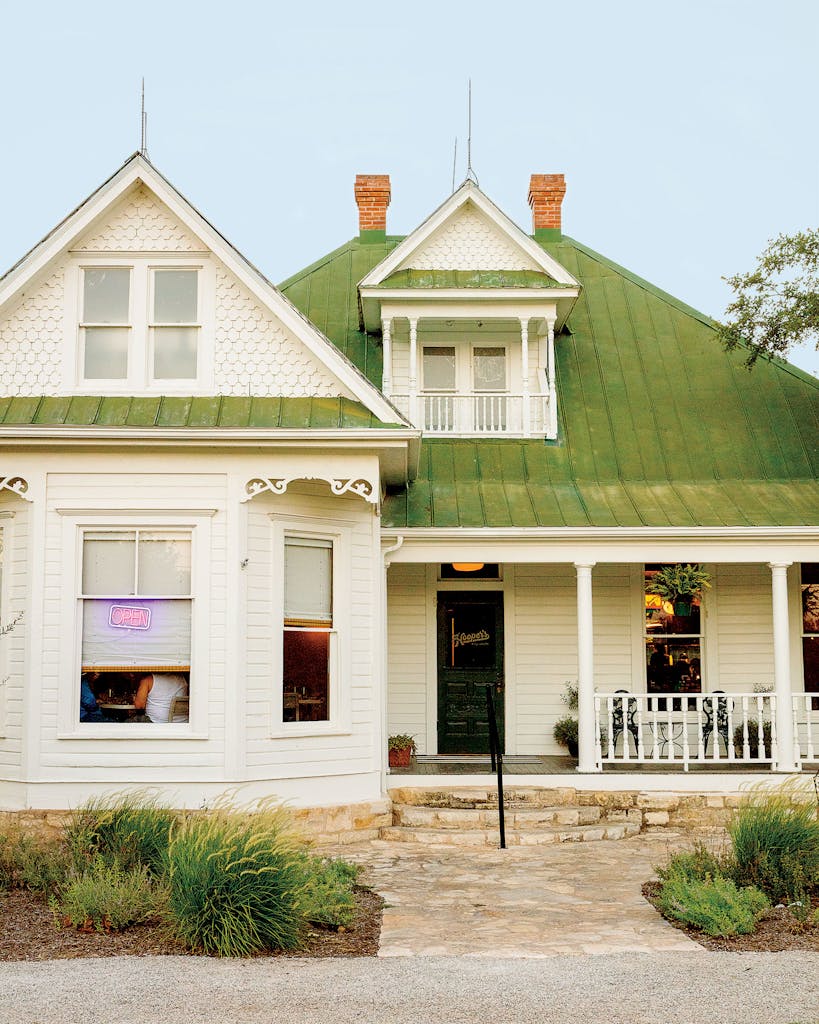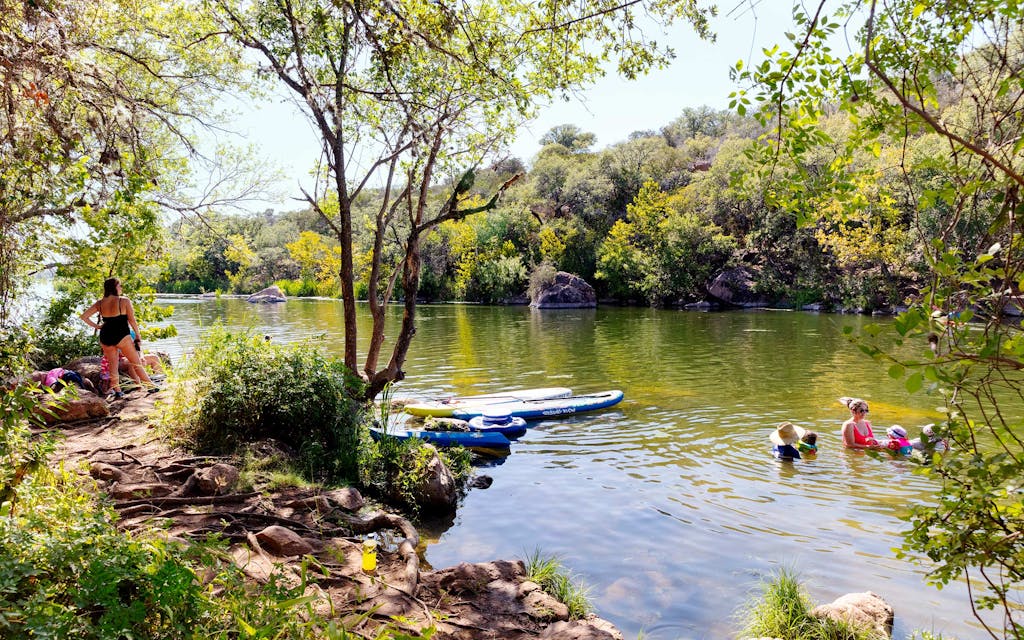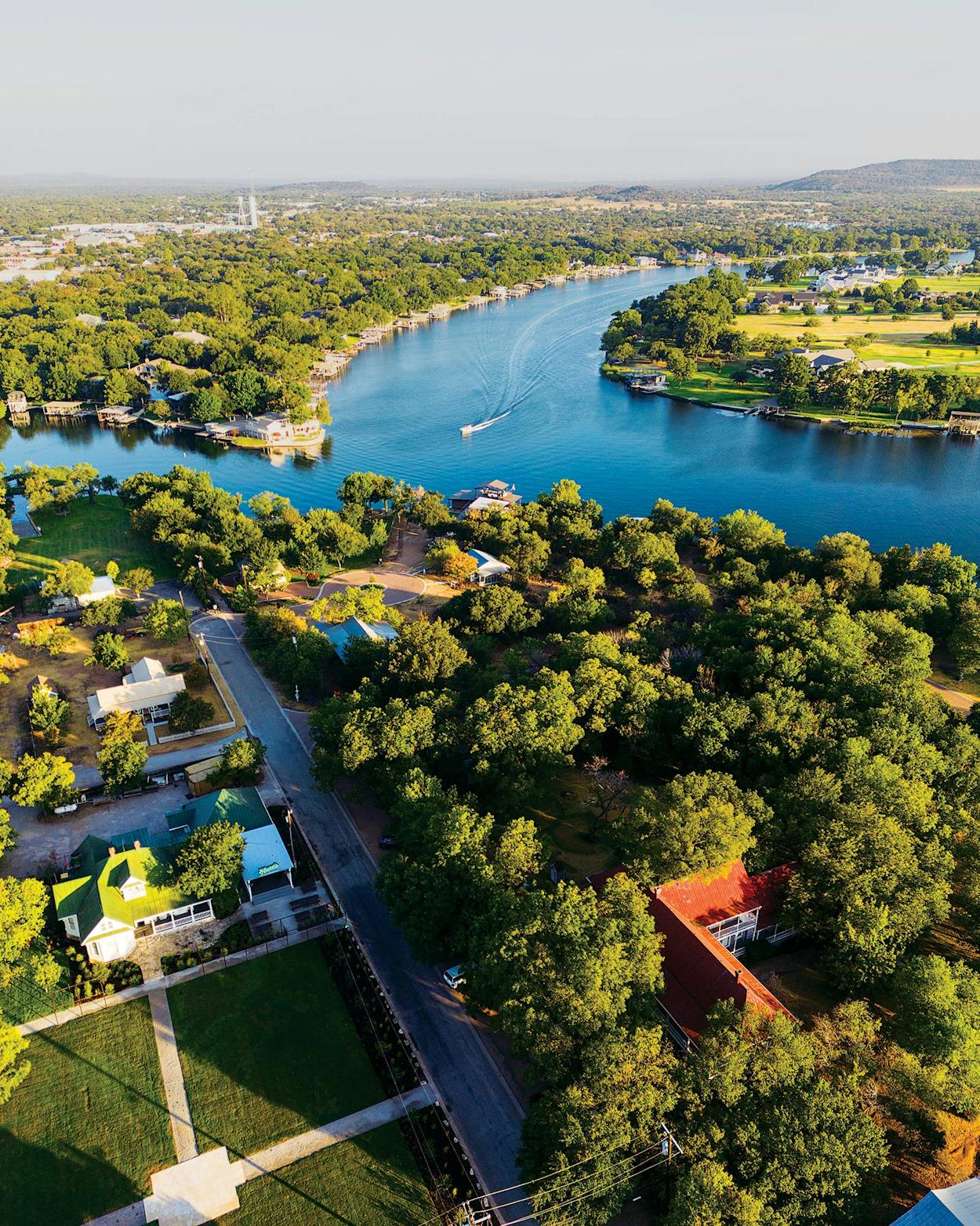“You’re a long way from Austin,” says a woman of copious eyelash and bountiful blond hair. I’m not sure if I hear a little reproach in her voice or if I’m just projecting. I don’t point out that she and I are making small talk at a bar that’s named after an Austin native, owned by Austinites, and attached to a 1909 Queen Anne–style farmhouse that was dismantled and hauled here from an Austin suburb. She turns her attention to the folks sitting on her other side, who are engaged in a contretemps over a friend’s order of a Bud Light. I pretend to study the food menu when I feel a tap on my shoulder. An older couple from New Braunfels want to know if I’d like to join their table. At the same time, my bar mate turns back to me and offers a fried shrimp from her basket, in case I’m thinking about ordering that.
Eight or so shrimp, a couple of cocktails, and another invitation later (to a lakeside lawn party), I walk out into the warm evening, marveling at the unwavering hospitality of a small town. In this case, that town is Kingsland, and I’m happily ensconced in a 1976 caboose from Southern Pacific’s defunct Texas and New Orleans rail line. The opportunity to spend the night in this now stationary train car is one of the reasons I’ve come to this lakeside hamlet, a mere seventy miles northwest of home, and to the Antlers Inn specifically. The yellow caboose is outfitted with a tiny kitchen, tinier bathroom, queen bed, wee bunk beds, and, best of all, a glass-and-steel cupola with two padded bench seats, accessed by very vertical, very narrow recessed steps. I’m sitting up here trying to ignore the cobwebby windowsills and, aided by mezcal and my imagination, pretending to ride the rails right out of everyday life, through pastures of live oak and honey mesquite, their branches alive with cicadas buzzing like so many gossamer chain saws.


Accommodations at Antlers include three such cabooses, a retrofitted coach car, and an 1800s-era depot that once served the Fayette County town of Muldoon and is now a two-bedroom, two-bath cabin. Guests can also choose one of the more traditional antiques-filled rooms housed in the original wood Victorian, built in 1901 to serve passengers traveling on the Austin and Northwestern Railroad (best known for hauling the pink rock that built the Capitol from nearby Granite Mountain). The eight-acre property abuts a quiet cove of Lake LBJ, but if you should tire of that Colorado River reservoir, Kingsland is perfectly situated for excursions to Buchanan and Inks lakes to the north and Marble Falls to the southeast. So train buffs and limnophiles, this town’s got you covered.
It’s got something for cinephiles too. Another reason I’m here is to dine at Hooper’s, the hotel’s restaurant and bar inside the aforementioned Queen Anne farmhouse, with its sloped green roof and gingerbread details. It’s named for Tobe Hooper, the director of a 1974 movie whose “very title,” as John Bloom wrote for this magazine in 2004, “has become America’s cultural shorthand for perversity, moral decline, and especially the corruption of children.” Yes, friends, pivotal scenes from The Texas Chain Saw Massacre were filmed at this house, and you can feast on a giant, slightly overseasoned ribeye in the same room where the cannibal family terrorized poor Sally Hardesty. The bar—a later addition to the original house—goes all in, displaying slightly unsettling posters (“Who will survive and what will be left of them?”) and framed autographs by everyone from Leatherface himself (Gunnar Hansen) to John Larroquette, who narrated the movie’s intro. But in the restaurant proper, the only nod to the egregiously anorectic film is tasteful portraits of unusually regal chickens.

It’s around 100 degrees when I visit Kingsland, in July. But lest I get to feeling sorry for myself, a local church’s letter board sign makes sure anyone who drives by realizes that “No! It’s not as hot as hell!” Maybe, but the town’s proximity to water is a real bonus. I’m blessed with options, including access to first-come, first-served kayaks at the inn’s dock. I take a thirteen-minute drive northeast to Inks Lake State Park to check out an attraction called the Devil’s Waterhole. “You are now entering a stress-free zone” reads the sign at the park entrance, and as I make my way down a path, I spot through the trees a slow-moving kayak with a lanky brown dog positioned at the bow like a figurehead, paddled by a long-bearded, cowboy-hatted dude who’s clearly gotten the message (if he ever needed it). Before I even reach the swimming hole, I can hear the squeals of happy children and the distinctive kerploosh of one daredevil after another jumping from tall cliffs formed from ancient metamorphic rock.
If you’re more into wading than cannonballing, I’d suggest the nearby Llano River. I check out the section aptly named the Slab, where Ranch Road 3404 crosses the water, which meanders through a moonscape of granite outcroppings shot through with milky quartz, forming diminutive rapids and clear pools of varying depth. I’d been advised to go in the morning, before the partiers arrive, but judging from the crowd, it looks as though I’ve missed the window. So I head a few miles north to Long’s Fish & Dig, a.k.a. Long’s Fish Camp, a.k.a. Long’s Fish, Dig, & Gold Panning. Goats roam outside the office; inside it’s a veritable cabinet of curiosities, from random feathers, bones, and baling wire to a boxy old TV tuned to the Grit channel. For a $10 entry fee, you have access to any stretch of the Llano that appeals to you. Navigate past fishing cabins that epitomize the word “rustic” and you’ll find, minus the occasional fishing lure or cardboard beer box, an unspoiled patch of river you’re likely to have all to yourself. Lie in a gurgling rivulet on a bed of water-polished stones and stare at the sky while curious little fish come by to see if you’re edible.

There’s a scene in The Texas Chain Saw Massacre where Pam, Sally’s red-shorts-wearing friend, bursts out the front door of the cannibal house only to have Leatherface grab her around the waist and drag her back in. I can relate. Maybe that’s why I was drawn to a place that evokes the romance of train travel, the exhilaration of fast boats, the impassivity of clear running water. The real world is here too, of course. Residents argue about library books and the eruption of gated waterfront communities and whether to allow sand dredging from Lake LBJ. Yet I still return to hot, hectic, congested Austin feeling as if I escaped, if only for a weekend.
Your Guide to Kingsland


Eat
Hooper’s: Yes, there’s the Texas Chain Saw Massacre connection. But the dining room is elegant, the service warm, and the food pretty good; I enjoyed fried pickles, a grilled chicken sandwich, and maybe the best wedge of chocolate cake I’ve ever had.
Patio 2900 at Boat Town: After I salivated over a Chris Craft 2023 Launch GT 25 MG Stern Drive, Heritage Trim Edition ($316,730), at the attached Boat Town showroom, I wandered down the ramp to Patio 2900 for a beer and a couple of slices of veggie pizza on a patio overlooking Lake LBJ.
El Bracero: The huevos a la mexicana are a highlight at this homey local favorite.
Shop
Duo Trading Company: Here, you’ll find some mid-century modern decor and a whole bunch of rattan.
Kingsland House of Arts & Crafts: From Barbie couture and tea towels to crocheted phone cases, the merchandise is hand-made by locals.
Re-Spin It: Need old skis or a pedestal sink? I got lost in the many pages of the fall/winter 1960 Sears catalog, priced at $45.
Do
Longhorn Cavern State Park: The “National Cave of Texas” is a ten-minute drive from Kingsland. Take a tour through 500 million years of geologic history embodied in a spectacular display of crystals and speleothems—like the Queen’s Watchdog—whose shapes defy belief.
This article originally appeared in the October 2023 issue of Texas Monthly with the headline “A Royal Welcome.” Subscribe today.









